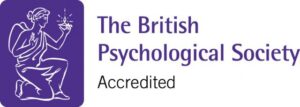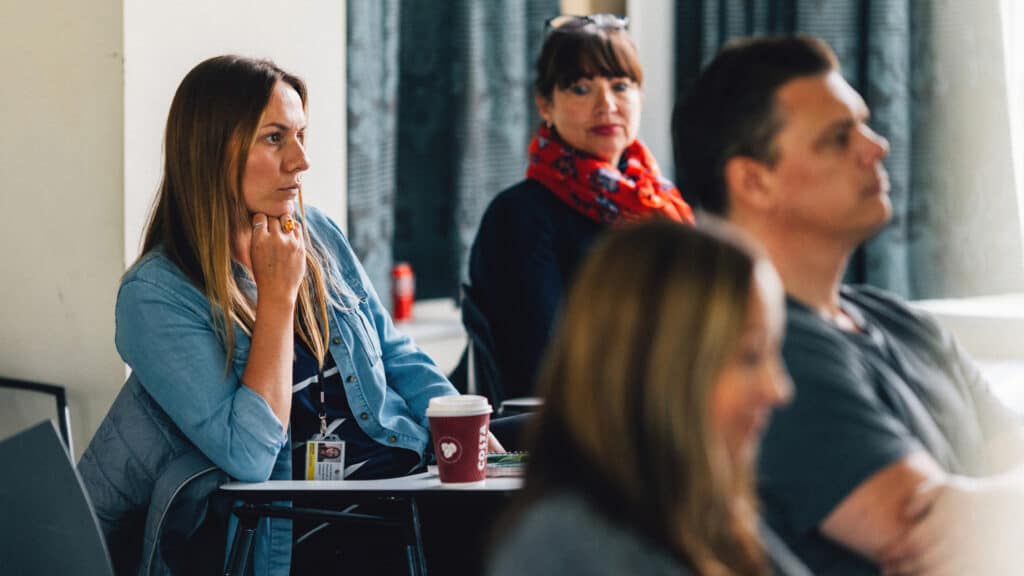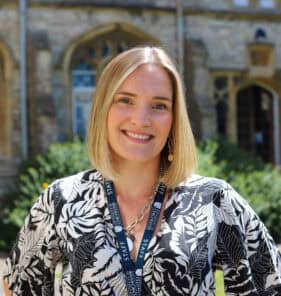Top 15
UK University for psychology
Guardian University Guide 2025
Gold
rated university in the Teaching Excellence Framework
Teaching Excellence Framework 2023
10th
in the UK for graduate prospects in Psychology
Complete University Guide 2025
Overview
Develop your skills and knowledge of Coaching Psychology
This one-year MSc (or two-year part-time) blended learning course will provide you with a solid grounding on coaching psychology theory and practice from a broad variety of psychology perspectives, helping you to use a research and practice-informed approach to promote change for individuals, organisations and their communities that is sustainable – attainable, lasting and respectful of the wider social and environmental context.
Additionally, the MSc Coaching Psychology programme covers a wide range of transferrable skills with real-world value, with an emphasis on personal development, professionalism and employability.
You will be expected to work towards a minimum of 80 hours of coaching supervised practice (for BPS Stage 1 accreditation), building on taught coaching psychology skills and practice during sessions (with a mandatory minimum of 20 hours of supervision, embedded in the course).
Research modules will introduce you to advanced research methods, which you will apply to your very own research-based coaching psychology project.
You will be assessed through observed skills practice, written assignments, supervisor’s reports and the completion of coaching hours. This course has no examinations.
Professional accreditation
By enrolling yourself in this MSc programme, you are studying the first MSc Coaching Psychology accredited by British Psychological Society (BPS).
Becoming a chartered coaching psychologist is a two-stage process. Successful completion of a BPS-accredited MSc Coaching Psychology (also known as Stage 1) provides you with eligibility to apply to complete Stage 2 training, provided you have Graduate Basis for Chartership (GBC) with the British Psychological Society (BPS).
Successful completion of Stage 1 and Stage 2 training confers eligibility Chartered status with the BPS.

Learn with the experts
Our MSc programme is led by a team of research-active academics, seasoned coaching practitioners and chartered coaching psychologists, guaranteeing cutting-edge training and education to excel in coaching psychology. This programme offers you a pathway to a rewarding career in coaching psychology, whether in paid employment or supporting you establish your own coaching and consultancy business.
It is also ideal for enhancing your leadership skills to be an effective leader for your team and organisation.
The Course
What you will study
You will study a selection of core modules. Each module is worth a number of credits and is delivered differently depending on its content and focus of study.
Modules
Advanced Research Methods and Approaches 1
The module will enhance your in-depth knowledge and understanding of advanced qualitative methodologies (e.g., interpretative phenomenological analysis, grounded theory, participatory action research), as well as quantitative methodologies (e.g., multivariate analysis of variance, regression-based approaches to process analysis and moderation analysis with continuous and categorical outcomes, and conditional process analysis).
Advanced Research Methods and Approaches 2
The module is designed to equip you with a wide range of methodological skills to conduct research of high quality and impact in your chosen field, enabling you to become a successful professional researcher in coaching psychology.
You will be equipped with the transferable knowledge and skills to solve real-world problems using advanced applied research skills relevant in a diversified range of applied psychology environments, which require advanced specialist knowledge regarding systematic review and meta-analytical approaches.
The module will enhance your in-depth knowledge and understanding of structural equation models, as well as visual research methods.
Coaching for Health & Well-being: individual and ecological approaches
This module fosters a critical exploration of different coaching approaches to improving physical health, mental health, and enhancing well-being, ranging from “goal oriented” approaches such as CBT, ACT, and solution-focused coaching (e.g., PRACTICE, OSKAR), to more “meaning making” approaches, such as positive, existential and ecological coaching.
Coaching for Ethical Leadership and Organisational Sustainability
The module focuses on empowering leaders and organisations to understand the impact of their decisions on the environment and society, and to work towards creating a sustainable future, while supporting their goals.
This module promotes your critical understanding of coaching approaches relevant to leaders and a wide range of organisations (e.g., corporate and non-profit), with particular focus on social processes and systemic perspectives.
It explores insights from research and theories developed in branches of psychology, such as social psychology, occupational psychology, community psychology, psychology of sustainability, and their contributions to a range of approaches in coaching psychology, as well as insights from business development.
Coaching Psychology Skills and Practice
This module provides you with advanced coaching skills and learning opportunities to apply relevant ethical, legal and professional practice frameworks, maintaining appropriate professional boundaries, understanding the importance, and make effective use of regular supervision, and support your own well-being and emotional regulation, as set out by the BPS Coaching Psychology Standards.
This module has a strong practical component, with a minimum of 80 hours of client work supported by skills sessions and a minimum of 20 hours of group supervision. It also has a self-reflective component aimed at helping you identify and plan continuing personal and professional development needs.
Coaching Psychology Independent Research Project
The content of the module is primarily driven by your interests and objectives, with guidance provided by the supervising tutor.
This module will show evidence of ability to lead a coaching psychology research project from inception to completion, encompassing the entire process from design and data collection to analysis and write-up. We frequently collaborate with our students on publishing their research outcomes.
Psychology of Coaching
This module aims to develop your knowledge, understanding and critical awareness of historical and contemporary psychology contributions to coaching psychology, with a particular focus on key areas in psychology (e.g., biological, cognitive, developmental, social). We will explore how psychological knowledge can support case formulation, key coaching models (e.g., GROW, SPACE) and techniques, with a chance to practice relevant coaching skills training in pairs or triads.
Teaching and Assessment
How you will learn
Teaching days will be Monday, and a maximum of two other days (Tuesday and/or Thursday).
Be part of a close-knit community
The process of ‘action learning’ and ‘skills practice’ plays a crucial role in this programme and thus offers a solid platform for you to collaborate with peers, share insights and connect with them in a friendly and supportive atmosphere.
Delivery
The course is delivered synchronously online, incorporating a range of virtual and blended learning methods. We recognise that life can sometimes get in the way, so sessions will be recorded where possible to allow you to catch up.
Kick-start your journey with us during our mandatory induction week, a vibrant five-day event (Monday to Friday) in the second week of September, hosted on Teams. This is your chance to meet our dedicated staff, explore the range of support services available, connect with fellow students and lecturers, and start practising your coaching skills in a supportive, collaborative environment.
Classes will begin in the first week of October, perfectly in sync with the academic calendar at Chichester. As a full-time student, you’ll engage in 12-18 hours of study per week, while part-time students can expect 9-12 hours. It’s a manageable commitment, tailored to help you grow, learn and succeed.
At the end of your course, you’ll present your research project at our exciting MSc conference, a fantastic opportunity to showcase your work and connect with peers. Whether you choose to attend in person or online, this conference will be an inspiring way to round off your course and share your achievements with the wider academic community. The conference will be available to attend both online and in person.
Supervised Practice
Completing 80 hours of client practice is a requirement for the course. While students are expected to secure their own clients, we are committed to supporting you throughout this process. We actively promote our trainee coaches through the University’s channels and provide group supervision throughout the course to ensure you receive ongoing guidance and support. Additionally, you will be covered by the University’s insurance for pro-bono coaching.
Rigorous assessments
Assessments will differ across our modules, and assignments include coursework essays, self-reflections, case studies, observed coaching sessions, project reports, group presentations and portfolios. The course has no examinations.
Meet programme coordinator Dr. Valentina Canessa-Pollard
Dr. Valentina Canessa-Pollard
Valentina is a performance coach and chartered psychologist. She is a senior lecturer and Programme Lead for BSc Counselling Psychology and MSc Coaching Psychology.
Valentina is passionate about supporting adults of all ages in aligning their lives with their aspirations. She specialises in career transitions and enhancing work and academic performance through a systemic approach. She also focuses on fostering meaningful connections with the natural environment to improve sustainable change.
Beyond coaching, Valentina’s professional interests and background are centred on preventing sexualised violence and abuse and facilitating recovery through psychological interventions. Find out more about the Sexualised Violence and Abuse Research Lab.
Course lecturers
Helen Neary
Helen is a Chartered Coaching Psychologist with the British Psychological Society and has her own coaching business in which she provides a range of coaching services.
Phoebe Simmons
Phoebe is part of the psychology and criminology lecturing team. She is a doctoral candidate on the professional doctorate programme in coaching and mentoring at Oxford Brookes and has four years working in private practice as a developmental coach.
Phoebe also has previous experience as a mentor supporting neurodiverse students for Autism Hampshire.
Facilities
Use industry standard equipment
Our facilities will help you get the very best from your studies throughout the MSc Coaching Psychology degree programme.
Specialist Advanced Research Software
Software for measuring and manipulating a broad range of psychological constructs; Inquisit, Qualtrics, Noldus Observer XT, E-prime, Superlab and Nvivo
Learning Resource Centre
Each campus has a Learning Resource Centre (LRC) which contains the library, a café, IT/teaching rooms and the Support and Information Zone (SIZ)
Library
Our campus libraries hold more than 200,000 books and over 500,000 eBooks
Careers
Where you could go after your studies
A career in coaching psychology and coaching
This MSc programme offers a comprehensive understanding and critical evaluation of advanced skills and theoretical knowledge essential for coaching across various contexts.
Successful completion of the course offers eligibility to Stage 2 doctoral-level training to become a chartered coaching psychologist with BPS.
Furthermore, students can explore the possibility of developing their own coaching or consultancy practice, progress in leadership and management roles, and pursue further training and accreditation with other coaching organisations, with portfolios from the programme serving as valuable evidence for inclusion in applications to coaching bodies such as the Association for Coaching (AC) and the International Coaching Psychology Society (ICSP).
It’s important to note that individual accreditation should be pursued only after meeting the requisite levels of experience, continuing professional development (CPD), supervision and training as outlined by the respective organisations’ criteria.
Transferable Skills
- Coaching and online/digital coaching core skills
- Communication skills
- Professional development
- Problem solving in creative and innovative ways
- Organisation and management
- IT skills
- Research methods skills
- Ethical, professional and legal practice skills
- Reporting and dissemination
- Scientific reasoning.
Career opportunities
Successful completion of the MSc Coaching Psychology means you will graduate with transferable skills suitable for working in sectors outside coaching psychology, such as:
- Education
- Welfare professions
- Human health
- Business
- Management
- Marketing
- Human resource management
- Research.
Course Costs
Course Fees 2025/26
UK fee
International fee
Course specific costs
For further details about fees, please see our Tuition Fee page.
University of Chichester alumni who have completed a full undergraduate degree at the University will receive a 15% discount on their postgraduate fees.
To find out about any other additional costs, please see our Additional Costs page.
Entry Requirements
We offer two routes of entry based on your academic background and BPS accreditation status.
1. Route for GMBPsS Holders (Graduate Basis for Membership of the BPS)
Minimum requirement: A 2:2 (Hons) degree in psychology, recognised by the British Psychological Society (BPS) as providing Graduate Basis for Membership (GMBPsS).
📅 Application Deadline: 30th June
2. Route for Non-GMBPsS Holders**
Minimum requirement: A 2:2 (Hons) degree in psychology (non-BPS accredited) or a related field (e.g., Counselling, Human Resources).
📅 Application Deadline: 5th May
**Important Information for Non-GMBPsS Applicants
The MSc Coaching Psychology is a BPS-accredited professional course. Applicants with a non-BPS-accredited undergraduate degree (minimum 2:2) may still apply, with eligibility assessed on a case-by-case basis (this may require you to complete an assignment).
However, please note:
- To use this MSc as a Stage 1 qualification for Chartered Coaching Psychologist training, GMBPsS is required.
- If you intend to continue to Stage 2 training, you will need to complete a BPS-accredited psychology (undergraduate or postgraduate conversion) course.
Additional requirements for all applicants
- Academic reference – A reference from an academic or professional source.
- Personal statement – A statement outlining your interest in Coaching Psychology.
- Interview – All suitable applicants must attend a short interview.
DBS and health checks (required for all accepted applicants)
Due to the 80 hours of coaching practice included in the course:
- A basic DBS check is required (£21.50, paid by the applicant).A health check is required (covered by the course).
- University insurance covers pro-bono coaching sessions within the 80-hour requirement.
- If undertaking additional or paid coaching, students must obtain their own insurance.
These checks ensure the safe and ethical completion of the coaching practice component.
Additional requirements for international applicants
- DBS Equivalent – International students must provide evidence of an equivalent background check.
- Professional Indemnity Insurance – Required for the 80 hours of coaching, with coverage based on local regulations in the student’s home country.
- English Language Requirement – If English is not your first language, an IELTS score of 6.5 overall (with no element lower than 6.0) is required.
📅 International Application Deadline: 5th May
Contact
For any questions regarding eligibility, please contact the Programme Lead, Dr. Valentina Canessa-Pollard: v.canessapollard@chi.ac.uk.






